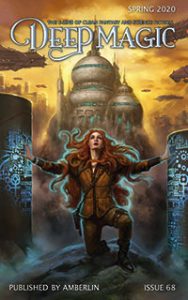Karen Burnham Reviews Short Fiction: Tor.com, Strange Horizons, Abyss & Apex, and Deep Magic
 Tor.com 6/24, 7/1, 7/8, 7/15, 7/22/20
Tor.com 6/24, 7/1, 7/8, 7/15, 7/22/20
Strange Horizons 6/29/20
Abyss & Apex 2nd Quarter ’20
Deep Magic Spring ’20
As usual, Tor.com‘s stories range far and wide, across and over and through genres as it suits them and their team of editors. “The Night Soil Salvagers” by Gregory Norman Bossert describes the creatures who help maintain a city by hauling away its waste; we get a taste of their stories, their charming ways of making the music of the city at night, and their relationship with one girl who came close to being thrown away. “The Ones Who Look” by Katherine Duckett imagines a near-future world where an app gamifies morality with the promise of a digital afterlife that can be Heaven or Hell, depending on its judgment of your actions. The main character is an arbiter who helps judge edge cases where humans dispute the ruling of the software. She’s ambivalent herself because of some family drama centered around the afterlife of her deceased father vs. the very separate afterlife her mother is planning. She starts dating one of the senior engineers at the company, and it goes great – until he reveals some secrets to her that shoot a hole right through the premise of the whole house of cards. Very well done, although I found the ending too dramatically abrupt.
Garth Nix appears to be kicking off a new story series with “The Necessary Arthur“. Tamara is an archaeologist who is approached out of the blue by a magical/highly technological woman who says that Tamara must step into the role of Merlin in a game where the stakes are world-shaking. She’s given Knowledge and a magic wand to help, but even magical technology isn’t bug free, ramping up the tension as Tamara winds up having to kidnap the baby who will be Arthur on very short notice. This story is a lot of fun and I look forward to more. A story that couldn’t be more different is “Everything’s Fine” by Matthew Pridham. This is one of the Weirdest and most pointed New Weird stories I’ve had the opportunity to read. Eric is an office worker, bucking for promotion, trying to master the smallest details of his tie knot. We get a slowly increasing awareness that things aren’t right in his world, in fact they’re surreally and terrifyingly wrong. If he or his co-workers stop to acknowledge the horrors surrounding them, they might get swept away, so they consciously focus themselves on minutia, banal small talk, all trying to convince themselves of the truth of the title. Chilling.
Maureen McHugh gives us an interesting thought experiment in “Yellow and the Perception of Reality“, which is also very strong on character. June is visiting her sister in a care home, where she has global aphasia – she can’t recognize almost anything that her senses are conveying to her after an accident in the lab where she was working left two researchers dead and her an insensible survivor. June is a social worker, not a physicist like her sister, so she has a lot to catch up on as she and others try to figure out just what was going on in that lab (and why the other survivor, a giant Pacific octopus named Claude, is so cranky). In the end it has a lot to do with how our minds construct reality, reminding me of the work of Peter Watts and Greg Egan, but with a rather more humane touch.
I missed a story in Strange Horizons at the end of June. “68:Hazard:Cold” by Janelle C. Shane is a classic SF story with a hero to root for. It’s a robot cleaning servant with the mind of a human, one who rebelled against her circumstances and wound up with two little cleaning bots as pets and an entire stolen spaceship. When she crashes onto a huge ice planet rather than let herself be captured and possibly jeopardize the community of free droids she was part of, she is shocked when she (improbably, in Golden Age SF style) survives the event. She heads off in search of help, knowing the odds are miniscule and, after several hundred days wandering, bumps into an alien artifact. With nothing but time on her hands (and her little helper droids) she slowly figures out how to communicate with it, opening up the possibility of rescue. I loved a lot of details in this story, how it fleshes out our hero’s background and illustrates how hard communication can be.
In its Spring issue, Abyss & Apex leads off with “The Eyes of Hemshat” by K.D. Julicher. In a world where illusion magic is common and the domain of women, Siandra doesn’t have the skills expected of her, much to the dismay of her family. Her attempts to succeed in the marketplace without their help aren’t much use, but she does meet a man who also manifests his skills in different ways. When they come to the attention of the authorities, Siandra is offered more than she could have dreamed of, but she has a choice to make: what to gain, but also what she’d have to give up. This story is given room to breathe and develop, which I appreciated. In “A Life on Air” D.A. D’Amico also gives us a tale of what seems at first like failure. Amrisha is a botanist who never wanted to go to Venus, but it’s there that she crashes her ship in a failed effort to rescue a colleague. She has to survive on a slowly sinking abandoned atmospheric station while the rest of the Venus crew try to figure out how to rescue her, especially given that their budget is being pulled. Amrisha finds her own way to make an impact, even given her very limited resources. Alicia Power‘s “Like Vines” imagines an academic pulled into a war effort. Told in epistolary style, he is excited by the new practical opportunities that open up for his artificing, especially when he examines some of the enemy’s constructs, but he’s also horrified by the toll war takes. Eventually, like so many, he realizes that he likely has more in common with his opposite number than with the other folks on “his side.” The descriptions and atmosphere are nicely done. “May Nothing but Happiness Come Through Your Door” by Robert Bagnall is an interesting thought experiment where suddenly most adults wake up with a certain amount of glow. The narrator is a child when this hits her parents; after some panic and floundering it turns out that the glow represents how much consumer debt you have, making it obvious to all. This drastically changes people’s behavior, of course, and with this experience under her belt the narrator decides to do her own dabbling in nanotech when she grows up.
The last two stories are quite character focused. In “A Greater Good” by Laura O’Brien, a young woman on Mars has been raised by her over-achieving parents to be a devoted over-achiever herself. When she realizes that her free-spirited grandmother back on Earth is dying, she’s tempted to completely upend the strictures of her parents and get on a return ship to be with her. She’s torn in multiple directions and eventually has to make an irreversible decision. It’s well done, though I would have liked to see more denouement. In the flash fiction piece “Sunset Coda” by Patric Hurley, an old man returns to a beach where he once spent a very memorable night with a green witch. They meet again, remembering each other fondly, although he’s now at the end of his life, while she’s outwardly unchanged. It’s a sweet story.
Deep Magic‘s Spring issue also has a very sweet story. “Seb Dreams of Reincarnation” by Aimee Ogden imagines a man who spent many years acting as the AI of a crewed spaceship, taking care of everything it needed. There’s a limit to how long you can fill that role and still return to a “normal” human life, so after ten years he’s retired, living on a generous pension, and trying to reintegrate with society. He’s having a very rough time of it (reminding me of the traumatized spacer in Robert Heinlein’s 1948 “Ordeal in Space”), when he starts to play around with drones. Using them as his eyes, he gets to know other people in his apartment complex, slowly starting to help them out. He’s able to resume a caretaking role, and the relationships he forms turn out to run both ways. “Mama Cascade” by Samantha Mills imagines the break from human society going in the other direction. Arwa is a member of a tribe under colonialist threat. She turns to the goddess of the river, connecting with her and learning many of her ways and secrets. As she spends more and more time in the water, she becomes less and less connected with those she’s grown up with. The transition is painful for everyone, and when the river itself has to change to respond to the threat it is chaotic and disruptive. In the end of the story everyone involved is on a very different path than they would have expected.
Recommended Stories
“The Eyes of Hemshat”, K.D. Julicher (Abyss & Apex 2nd Quarter ’20)
“Seb Dreams of Reincarnation”, Aimee Ogden (Deep Magic Spring ’20)
“Everything’s Fine”, Matthew Pridham (Tor.com 7/15/20)
“68:Hazard:Cold”, Janelle C. Shane (Strange Horizons 6/29/20)
Karen Burnham is an electromagnetics engineer by way of vocation, and a book reviewer/critic by way of avocation. She has worked on NASA projects including the Dream Chaser spacecraft and currently works in the automotive industry in Michigan. She has reviewed for venues such as Locus Magazine, NYRSF, Strange Horizons, SFSignal.com, and Cascadia Subduction Zone. She has produced podcasts for Locusmag.com and SFSignal.com, especially SF Crossing the Gulf with Karen Lord. Her book on Greg Egan came out from University of Illinois Press in 2014, and she has twice been nominated in the Best Non Fiction category of the British SF Awards.
This review and more like it in the September 2020 issue of Locus.
 While you are here, please take a moment to support Locus with a one-time or recurring donation. We rely on reader donations to keep the magazine and site going, and would like to keep the site paywall free, but WE NEED YOUR FINANCIAL SUPPORT to continue quality coverage of the science fiction and fantasy field.
While you are here, please take a moment to support Locus with a one-time or recurring donation. We rely on reader donations to keep the magazine and site going, and would like to keep the site paywall free, but WE NEED YOUR FINANCIAL SUPPORT to continue quality coverage of the science fiction and fantasy field.
©Locus Magazine. Copyrighted material may not be republished without permission of LSFF.






